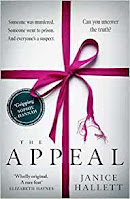The Appeal by Janice Hallett
On the face of it, The Appeal shouldn't be anything like the page-turner that it is. It's not a fast-paced thriller. There's no lurking serial killer, no police work, no espionage, no detective, none of that. For most of the book, we're reading a substantial pile of emails, text messages and press clippings relating to a provincial amateur dramatics society. These documents are part of a QC's evidence bundle for an appeal against someone's murder conviction, but we aren't even told who the supposed victim is, let alone who is is in prison.
That means it's up to us to piece together what's happened from the content and tone of the conversations available. It becomes clear that the wealthy, middle-class Hayward family, who own a local hotel and health club, are at the centre of their social circle and are the driving force behind the Fairway Players. Martin Hayward runs the group and, along with his son James, directs the shows, while his wife Helen and daughter Paige are the perennial leading ladies while everyone else is vying for the best supporting roles, both on and off stage. When Martin and Helen's two-year-old grandchild, Paige's daughter Poppy, is diagnosed with a brain tumour, their friends and hangers-on immediately form a committee to crowdfund an experimental new treatment from America.
Meanwhile, Fairway Players stalwart Issy Beck has introduced two new members to the group. Issy is a nurse on a geriatric ward and is delighted when her new colleague Sam Greenwood and her husband Kel agree to audition. Sam and Kel have just returned from volunteering in Africa with Medecins Sans Frontieres but why did they leave? And what's their connection with Poppy's doctor?Creative writing students are often instructed to 'show, not tell' when it comes to their characters and Janice Hallett is certainly an absolute master of this. With only the characters' own words to go on, we can immediately start to build up a clear picture of each of them and of the group dynamic. Issy's excitable, over-enthusiastic and almost childlike emails have a clingy, obsessive note to them. The bossy, capable tones of Sarah-Jane McDonald, who as a former charity sector fundraising manager is naturally best placed to assume the mantle of campaign coordinator for A Cure for Poppy are spot-on - sometimes persuasive, sometimes hectoring. Martin Hayward is confidently authoritative while his son, James, takes a softer and more theatrical tone. And - importantly - what isn't said is often as revealing as what is.
Every character is acutely well-observed, as are the social interactions between them, the constant low-level battle for status within the group and the rapidity with rumours and speculation spread from one to another. It's as much a satire on the nature of certain types of social group as it is a puzzle to be solved and it is frequently very funny.
I'm sure some readers may not take to the way the story is told, or to the gossipy pettiness of so many of the characters' interactions - it has a very parish council feel to it, and there are definitely characters who would not accept that Jackie Weaver has any authority here, so you will occasionally have a strong urge to punch them. But I'm fascinated by this kind of very English, microcosmic story and while I'm delighted that I never have to spend time with these people in real life, I was delighted to observe them from afar.

Comments
Post a Comment